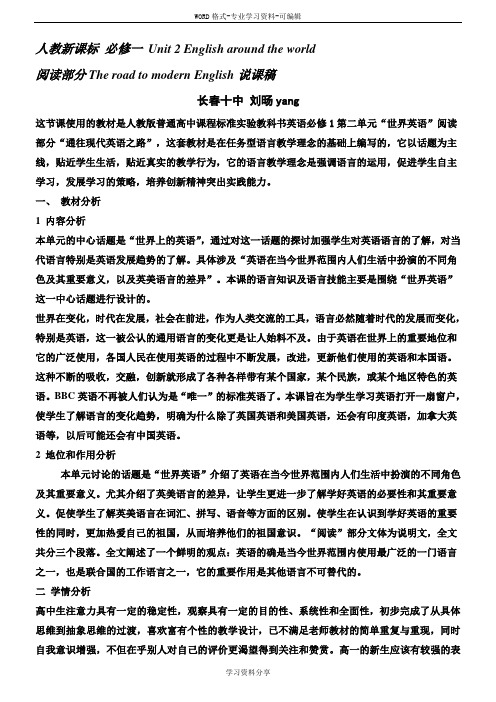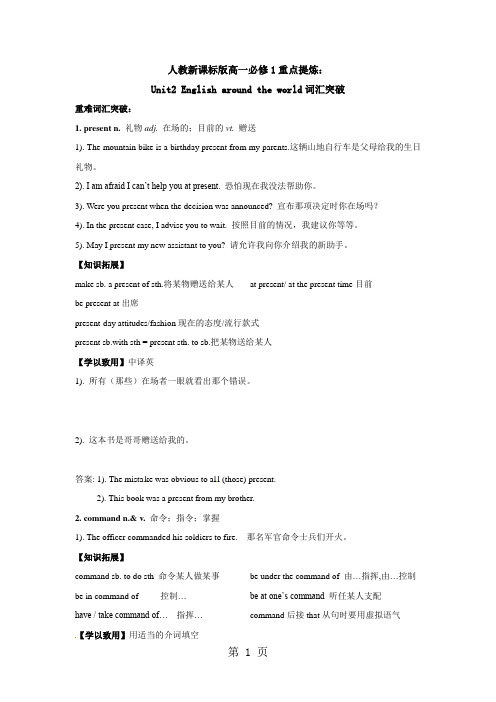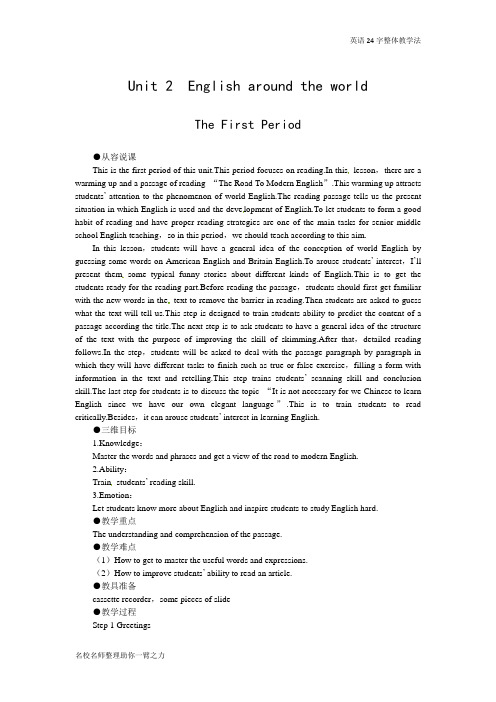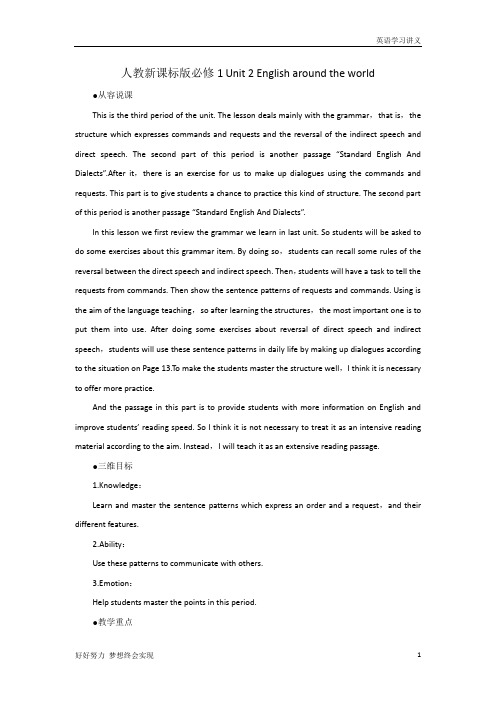人教版高中英语必修一高一Unit2EnglishAroundtheWorld句型语法分析课件
人教版高中英语 必修一 Unit2 《English around the world---Reading》 课件 (共28张ppt)

The road to modern English
The road Modern English
?
The development/ What kind of English process of English before modern English
Reading
The Road to Modern English
Prediction
1. Look at the title and predict what the passage is about. (the main idea)
The road to modern English
2. If you are given this title, how will you organize this article? What sequence(顺 序)will you adopt?
Unit 2 English around the world
Try to find out what goes wrong in the following situation?
Go along this street and turn right at the second turning. You can see the subway on your right.
• In the 19th century, two big changes in Englisshp_e_lli_n_g___ happened, and American ________ English got its own _id_e_n_t_it_y_.
人教新课标 必修一 Unit 2 English around the world

人教新课标必修一Unit 2 English around the world阅读部分The road to modern English说课稿长春十中刘旸yang这节课使用的教材是人教版普通高中课程标准实验教科书英语必修1第二单元“世界英语”阅读部分“通往现代英语之路”,这套教材是在任务型语言教学理念的基础上编写的,它以话题为主线,贴近学生生活,贴近真实的教学行为,它的语言教学理念是强调语言的运用,促进学生自主学习,发展学习的策略,培养创新精神突出实践能力。
一、教材分析1 内容分析本单元的中心话题是“世界上的英语”,通过对这一话题的探讨加强学生对英语语言的了解,对当代语言特别是英语发展趋势的了解。
具体涉及“英语在当今世界范围内人们生活中扮演的不同角色及其重要意义,以及英美语言的差异”。
本课的语言知识及语言技能主要是围绕“世界英语”这一中心话题进行设计的。
世界在变化,时代在发展,社会在前进,作为人类交流的工具,语言必然随着时代的发展而变化,特别是英语,这一被公认的通用语言的变化更是让人始料不及。
由于英语在世界上的重要地位和它的广泛使用,各国人民在使用英语的过程中不断发展,改进,更新他们使用的英语和本国语。
这种不断的吸收,交融,创新就形成了各种各样带有某个国家,某个民族,或某个地区特色的英语。
BBC英语不再被人们认为是“唯一”的标准英语了。
本课旨在为学生学习英语打开一扇窗户,使学生了解语言的变化趋势,明确为什么除了英国英语和美国英语,还会有印度英语,加拿大英语等,以后可能还会有中国英语。
2 地位和作用分析本单元讨论的话题是“世界英语”介绍了英语在当今世界范围内人们生活中扮演的不同角色及其重要意义。
尤其介绍了英美语言的差异,让学生更进一步了解学好英语的必要性和其重要意义。
促使学生了解英美语言在词汇、拼写、语音等方面的区别。
使学生在认识到学好英语的重要性的同时,更加热爱自己的祖国,从而培养他们的祖国意识。
人教版高中英语必修一《Unit2Englisharoundtheworld-Period》1

Period 1 Warming Up,Pre-reading & Reading
Ⅰ.单词识记 1.________/ə'fIʃl/ adj.官方的;正式的;公务的 2.________/'vɒIIdʒ/n.航行,航海 3.________/'neItIv/ adj.本国的,本地的n.本地人,本国人 4.________/'æktʃuəlI/ adv.实际上,事实上________adj.实际 的,现实的 5.________/beIs/ vt.以……为根据n.基部,基地,基础
2.Careful Reading:Read the text carefully and then decide whether they are true or false.
①In the 17th century, many people outside England began to speak English.( )
②According to the text, which of the following statements is TRUE? A.Languages always stay the same. B.Languages change only after wars. C.Languages no longer change. D.Languages change when cultures change. ③From AD 450 to 1150, English sounded more like ________. A . F r e n c h B . C h i n e s e C . G e r m a n D.Russian
When you speak English, you don't have to sound American or British. All you have to do is speak clearly, so people can understand you.
高一人教新课标必修1 Unit 2 English around the world

Do you know the American way of saying the following words
lift
elevator sweet chemist’s rubbish trousers holiday the first floor the second floor underground lorry candy drugstore trash pants vacation ground floor first floor subway truck
Homework
1.Oral work:Why do so many people speak English? 2.Preview the reading
Unit Two
English Around the World
(Period One)
Let’s discover more about
English!
Fun Time
Are you a native speaker of Cantonese? If not, where is your native place? Use you native language to say “Hello” to your classmates!!!!!!!
Englishes spoken in different countries are different.
World Englishes
American English British English
Australian English Canadian English
New Zealand English Singapore English
人教新课标版高一必修1重点提炼:Unit2Englisharoundtheworld词汇突破

人教新课标版高一必修1重点提炼:Unit2 English around the world词汇突破重难词汇突破:1. present n. 礼物adj.在场的;目前的vt.赠送1). The mountain bike is a birthday present from my parents.这辆山地自行车是父母给我的生日礼物。
2). I am afraid I can’t help you at present. 恐怕现在我没法帮助你。
3). Were you present when the decision was announced? 宣布那项决定时你在场吗?4). In the present case, I advise you to wait. 按照目前的情况,我建议你等等。
5). May I present my new assistant to you? 请允许我向你介绍我的新助手。
【知识拓展】make sb. a present of sth.将某物赠送给某人at present/ at the present time目前be present at出席present-day attitudes/fashion现在的态度/流行款式present sb.with sth = present sth. to sb.把某物送给某人【学以致用】中译英1). 所有(那些)在场者一眼就看出那个错误。
_______________________________________________________________________________2). 这本书是哥哥赠送给我的。
_______________________________________________________________________________ 答案: 1). The mista ke was obvious to al l (those) present.2). This book was a present from my brother.2. command n.& v. 命令;指令;掌握1). The officer commanded his soldiers to fire. 那名军官命令士兵们开火。
人教版高中英语必修一Unit2Englisharoundtheworld整个单元课件

15
Reading–III(5m)
Groupwork: Whatcanyoulearnfromthispassage? (discussingroupoffour,thenaskthestudentsto showtheirideas.)
2.Prepareforthenextclass. 3.FinishtheexercisesonWB.
19
20
Period3Learningaboutl anguage
Unit2Englisharoun dtheworld
21
Period3:幻灯片27-48页
Revision(3m)
Match:(Reivewthenewwords)
sIspoketothemjustnow? Helpthestudentsunderstandwhatisaco mmandorarequest.
27
Learningusefulstructure–II(2m)
Makeclearthedifferencebetweencommandsan drequestsandfinishthefollowingexercises:
apartment
autumn
fall
underground(地铁) subway university(大学) college
rubbish(垃圾) garbage
dustbin(垃圾箱) trashcan
holiday
vacation
fortnight(两星期)twoweeks
12
Reading–I(3m)
&
人教版高中英语 必修一 Unit2 《English around the world---Reading》 课件 (共27张ppt)

Para 3-4:
C. Native English speakers can understand each other but not everything.
Para5:
D. English is spoken as a foreign or second language in many countries.
passage is mainly about?
The road to modern English
way or development?
The road
the development of English language
Scan the text to match the key sentence for each paragraph.
Br E
football
Am E
soccer
Br E
lift
Am E
elevator
Br E
flat
Am E
apartment
Read Para 3 and answer the que
Why does English change over time? Because of cultural communication.
_t_h_e_E__n_g_li_s_h_L_a_n__g_u_a_g_e_. English is also spoken as a foreign or second language __in__S_o_u_t_h_A__si_a_ _S__o_u_th__A_f_r_i_ca__ _C__h_in__a_ and so on.
Para 2
If an American is talking to an Englishman,
人教版高中英语必修1 Unit 2 English around the world(2)

AmE
apartment bar can candy
cookie elevator game soccer
fall gas
BrE & AmE
Main
differences
BrE
colour spelling travelled
dance [da:ns]
pronunci neither [ni:ðə] -ation either [aiðə]
Conclusion
Language can change when cultures communicate with each other.
Language can change with time. time
place
1) Try to retell the text by your own.
England
people
the next century
Many other countries
today
More people speak in more countries
If an American is talking to an Englishman, _______. A. They will have almost no difficulty in understanding B. They will have a lot of misunderstandings between each other C. The American finds it difficult to understand the Englishman D. The English man finds it difficult to follow the American
人教版高中英语必修一(Unit2 English around the world the 1st period)

Unit 2 English around the worldThe First Period●从容说课This is the first period of this unit.This period focuses on reading.In this lesson,there are a warming up and a passage of reading “The Road To Modern English”.This warming up attracts students’ attention to the phenomenon of world English.The reading passage tells us the present situation in which English is used and the deve lopment of English.To let students to form a good habit of reading and have proper reading strategies are one of the main tasks for senior middle school English teaching,so in this period,we should teach according to this aim.In this lesson,students will have a general idea of the conception of world English by guessing some words on American English and Britain English.To arouse students’ interest,I’ll present them some typical funny stories about different kinds of English.This is to get the students ready for the reading part.Before reading the passage,students should first get familiar with the new words in the text to remove the barrier in reading.Then students are asked to guess what the text will tell us.This step is designed to train students ability to predict the content of a passage according the title.The next step is to ask students to have a general idea of the structure of the text with the purpose of improving the skill of skimming.After that,detailed reading follows.In the step,students will be asked to deal with the passage paragraph by paragraph in which they will have different tasks to finish such as true-or-false exercise,filling a form with information in the text and retelling.This step trains students’scanning skill and conclusion skill.The last step for students is to discuss the topic “It is not necessary for we Chinese to learn English since we have our own elegant language”.This is to train students to read critically.Besides,it can arouse students’ interest in learning English.●三维目标1.Knowledge:Master the words and phrases and get a view of the road to modern English.2.Ability:Train students’ reading skill.3.Emotion:Let students know more about English and inspire students to study English hard.●教学重点The understanding and comprehension of the passage.●教学难点(1)How to get to master the useful words and expressions.(2)How to improve students’ ability to read an article.●教具准备cassette recorder,some pieces of slide●教学过程Step 1 GreetingsT:Good morning,boys and girls!S:Good morning,teacher!Step 2 Warming upT:English is a widely used language.Do you know in which countries English is spoken as their native language?S a:The US,the UK,Australia,Canada...T:(a slide:Nancy:Oh,there you are.Now then,did you have a good flight?Joe:Sure,we flew all the way direct from Seattle to London.Nancy:You must be very tired.Did you sleep at all on the plane?Joe:No,not really.I’m very tired.Could I use your bathroom?Nancy:Why,of course.You don’t need to ask,just make yourself at home.Let me give you a clean towel.Joe:A towel?Nancy:Yes.Here you are.The bathroom is upstairs.It’s the second door on the left.(After a while)Nancy:Have you found it?Joe:Well,eh,yes,I mean no.I mean,I found the bathroom,but I didn’t find what I was looking for!)Here is a short dialogue.Read it and discuss with your partner:What is it that Joe can’t find in the bathroom?Why can’t he find it?S b:It is the toilet.T:And why?S c:Perhaps when Joe says “bathroom”,he means a place,where there is a toilet.But in Nancy’s eyes,it is a place where people can only have a bath.T:You are right.Do you know why there’s a misunderstanding between them?S d:Because they sp eak different kinds of English.T:Great.There’s more than one kind of English in the world.In some important ways they’re different.They’re called world English.Can you guess what they include?S e:Canadian,British,American,Australian and Indian English.T:Right.So you know even two native speakers of English may still not speak the same kind of English.Look at the examples on P9.Now try to guess which of the following words are British English and which are American English.Suggested answers:Am.English:mom;on a team;rubber;gasBr.English:mum;in a team;eraser;petrolStep 3 New WordsT:From today on,we’ll learn something about English around the world.First of all,let’s get familiar with the new words.Yesterday I asked you to read the new words and look up the meaning of them.Now let’s have a game in which one of you tells us the meaning or the explanation of the words and the others guess which word it is.Let’s go!Suggested explanation:1.include:have something or somebody as one of a group.e.g.:The tour included a visit to the Science Museum.2.play a role in:have a part in3.international:connected with two or more countries4.native:(1)connected with the place where you have always lived or have lived for a long time(2)a person who lives in a particular place,especially sb. who has lived there a long time5.elevator:lift6.flat:(1)having a smooth surface (2)(Br. E)a set of rooms for living in7.apartment:(Am. E)a set of rooms for living in8.modern:of the present time or recent timee up:to move toward10.culture:the customs and beliefs,art,way of life and social organization of a particular country or group11.actually:really;in fact12.present:(1)existing or happening now (2)being in a particular place13.rule:control14.vocabulary:all the phrases and phrases you learnage:the way in which words are used in a language16.identity:who or what sb./sth. isernment:the group of people who are responsible for controlling a country or a state18.rapidly:fastT:That’s great!You’ve made a good preparation.Now please read the words together.(show words and explanations on the slide)Step 4 Pre-readingT:Just now,we’ve known that there’re many kinds of English in the world.Then why are there so many kinds?Ss:We don’t know.T:Anyway,we’ll find out the cause today.Now read the title of the passage “the road to modern English”.What do you think it will tell us?S f:I guess it will tell us the development of English.Step 5 SkimmingT:Now let’s find out whether your answer is right.So please read the passage fast in silence and find out the main idea of each paragraph.Suggested answer:Para.1:Brief introduction of the change in English.Para.2:An example of different kinds of English.Para.3:The development of English.Para.4:English spoken in some other countries.Step 6 ScanningT:You’ve mastered the structure of the passage.Now please read para.1 and 2 loud in detail.T:(several minutes later)Have you finished?Here’re some statements of which some are right while some not.Read them and then tell whether they are true or false.If false,please find out the mistake and correct it.(slides:1.Most of the English speakers in the 16th century lived in England.2.More and more people use English as their first or 2nd language.3.The US has the largest number of English speakers.4.Native English speakers can understand everything because they speak the same kind ofEnglish.)S g:The first one is true.S h:The second one is true.S i:The third one is false.China has the largest number of English speakers.S j:The fourth one is false.Native English speakers may not be able to understand everything because they do not speak the same kind of English.T:You did a very good job.Now please read para.3 after the tape.And then fill in the formThe Road To Modern EnglishThe cause:Cultures communicate with one anotherTime Things that happenedBetween AD 450and 1150Based on German1150 to 1500 Less like German;more like French→why?→because Frenchmen ruled England thenIn the 1600’s Shakespeare broadened the vocabulary.A big change in English,giving its own identity→why?→caused by “American Dictionary of the English language”written by Noah WebsterLater British people brought English to AustraliaT:We know culture communication brings about changes in English.Can you think of any effect that Chinese has on English?S k:In English there are some Chinese words such as gongfu,long time no see,...T:Great!With more closely communication of culture,English is changing more frequently.T:As we all know,English is spoken as the native language mostly in western countries.Then what about English in some other parts of the world?After reading the last paragraph,would you please say something about the present situation of English in your own words?S l:It is also spoken as a foreign or 2nd language in many other countries.For example,in India,it is used for government and education.In some African and Asian countries,it is also spoken,such as in South Africa,Singapore and Malaysia.While in China,the number of English speakers is increasing fast.T:Quite good.Step 7 DiscussionT:So far,we’ve known that English is becoming more and more important in China.It has been an important subject for Chinese students.But someone say that Chinese is a much more elegant language.So it is more important for us to master it and it is not so necessary for us to master a foreign language.Do you agree with this opinion and why?Suggested answer:I don’t agree with it.With the cultural communication becoming more and more frequent,the chance to contact foreigners,exported goods,international conferences,and so on,is more and more.As the most widely used language,English is regarded as the language used in most international situations.Thus,if we want to keep up with the times,we’d better master English and use it as a tool.Step 8 Summary and homeworkT:Today we’ve learned an article on “the road to modern English”.After class,you shouldread it again and again to get the idea of the text further.Do the exercises of comprehending and try to tell your partner something about English in our own words.That’s all for today.Class is over.●板书设计Unit 2 English around the worldThe First PeriodNew words:Main idea of each para-graph:... ...... ...●活动与探究This activity is to make research into differences between different kinds of world English and some words from other languages in English.Differences Pronunciation Spelling MeaningUsage...Words from other languages Chinese Japanese French Spanish German...●备课资料Soon There Will Be No Such Thing As “Wrong”English In this article:Senior Indian journalist Gautaman Bhaskaran says that English is so flexible that one day there will be too many variations around the world.English is a victim of its own success.The other day The Times in London displayed a cartoon showing an excited schoolboy flaunting his test scores:“I done good in English.”Days later,editors of the Oxford Dictionary of English rued the spread of what they termed “greengrocer’s English”.Grammar and syntax,they regretted,were going out of fashion.Others in England—in the Oxf ord University Press,the BBC and so on—said the incorrect use of cliches were marring the smooth flow of a great language whose ability to imbibe and absorb has been one important reason for its success.This success also stems from the language’s unique position of being the only one spoken in most parts of the world.Really,English has no boundaries.Even in countries such as Japan and China,which were not colonized by Britain,English is making a determined “conquest”.Unfortunately,such a conquest is not always welcome because a language sometimes doubles as a political weapon.At some point it ceases to be just a means of communication and English is a classic example of this.It has always led a troubled life.It has been disliked,even hated,largely because the people who originally spoke English conquered,colonized and terrorized half the world,or just about.The animosity to the language continues,at least in some places.The bitterness that the French,for instance,have for English is a g ood example of a language being giving a quasi-political role in society.Fortunately,this aversion does not run as it did some years ago,and there is a growing realization that English is the lingua franca.China and Japan,among a host of other nations,have been making serious efforts to promote the language.Some months ago there was a hue and cry in Singapore over the spread of “terrible English”which the authorities called “Singlish”.“Down with it!”they said,and urged Singaporeans to learn correct English,the phenomenal flexibility of which has often made things difficult for those who have to use it every day.Today even university graduates find it hard to pen a couple of correct sentences in it.More horrifying is that many teachers and university vice-chancellors speak and write poor and ungrammatical English.Often,they are found to be out of touch with what is called “usage”and,as we all know,this is one of the pillars the language rests on.Yet,despite the mess that English is in India,the nation has—more than two centuries after Samuel Johnson wrote his English dictionary—become the hottest destination for top lexicographers.The new 10th revised edition of the Oxford Concise English Dictionary includes hundreds of Indian words.Leading the list of 600 Indian English entries are “Hindutva”(Hindu identity),“dada”(older brother),“panchayat”(local administration),“chai”(tea),“pani”(water),“puri”(a dish made of wheat)and “dosa”(rice pancake).In fact,Indian words from 20 per cent of entries and rank as the third-largest component after American and Australian English segments.Other former British colonies such as New Zealand,South Africa and the Caribbean islands follow the Indian English collection of words.English,despite its hiccups,is endearing to the common Indian man or woman.About 150 years after Lord Macaulay introduced the language in India to create “babus”(clerks)for the British bureaucracy,70 million Indians speak English,a number that is higher than that in Britain.However,there is a sneaking fear among Puritans that with this kind of sp read,English may stop being English.While the French have fanatically preserved the purity of their language,the English have liberally allowed other influences to affect their lingo.So,what is seen as its strength —the fact that people all over the world understand it—can be an undermining obstacle.There might be a serious problem if every state or continent were to have its own version of English.As one writer said:“There is a risk in relentless atomization.”With too many variations of the language,a time may come when one group of English-speaking people may not be able to understand another.This is happening.Hear the way Singaporeans speak English.Listen to the Australians pronouncing “e”;it sounds like “a”.A few of the films made lately by British directors Ken Loach and Mike Leigh had to have subtitles in English.Accents in the north of Britain can be hard for people in the south to understand,let alone those outside the island.The point is,no language must be allowed such flexibility—anything goes in the name of functional communication—that people begin to take liberties with it.Ultimately,there may be no such thing as wrong English.The schoolboy in the Times cartoon was doing just that.He knew nobody would scold him for getting his English wrong.不久以后就没有“错误的”英语这一说了英语成了自身成功的牺牲品,前几天,伦敦的《泰晤士报》刊登了一幅漫画,上面画了一个兴高采烈的男学生炫耀他的考试成绩:“I done good in English”(我的英语成绩不错)。
人教版高中英语 必修一 Unit2 《English around the world---Read

D. Languages change when cultures
meet
Scanning Reading Comprehension III
True or false
1 English had the most speakers in the 17th century.
2 English developed when new settlers and rulers came to Britain.
2. The text is developed mainly by ____.
A. place B. time C. people
3. At the end of the _____ century,
about five to seven million people
spoke English.
of the English language.
Discussion
Choose one of the topics below and discuss it with your partners.
1. Why do you think people all over the world want to learn English?
1. The text mainly tells us ___________. A. that old English is different from the English today B. how Middle English formed C. English and its history D. that English will keep changing
17th century today
人教版高中英语必修一+Unit+2+English+around+the+World+Period+2+教案2+

人教新课标版必修1 Unit 2 English around the world●从容说课This is the third period of the unit. The lesson deals mainly with the grammar,that is,the structure which expresses commands and requests and the reversal of the indirect speech and direct speech. The second part of this period is another passage “Standard English And Dialects”.After it,there is an exercise for us to make up dialogues using the commands and requests. This part is to give students a chance to practice this kind of structure. The second part of this period is another passage “Standard English And Dialects”.In this lesson we first review the grammar we learn in last unit. So students will be asked to do some exercises about this grammar item. By doing so,students can recall some rules of the reversal between the direct speech and indirect speech. Then,students will have a task to tell the requests from commands. Then show the sentence patterns of requests and commands. Using is the aim of the language teaching,so after learning the structures,the most important one is to put them into use. After doing some exercises about reversal of direct speech and indirect speech,students will use these sentence patterns in daily life by making up dialogues according to the situation on Page 13.To make the students master the structure well,I think it is necessary to offer more practice.And the passage in this part is to provide students with more information on English and improve students’ reading speed. So I think it is not necessary to treat it as an inte nsive reading material according to the aim. Instead,I will teach it as an extensive reading passage.●三维目标1.Knowledge:Learn and master the sentence patterns which express an order and a request,and their different features.2.Ability:Use these patterns to communicate with others.3.Emotion:Help students master the points in this period.●教学重点Point out the features of an order—which uses the imperative,namely “tell/order sb. to do sth.” and a request—which uses a question form or an imperative,very polite,namely “ask sb. to do sth.”●教学难点How to change orders and requests into reported orders and requests.●教具准备slides●教学过程Step 1 Greetings and revisionGreet the whole class as usual.Review the useful words and expressions by letting students make up sentences using these words and expressions.Step 2 GrammarT:In the last unit,we have learnt something about the direct speech and indirect speech. We know while we change direct speech into indirect speech,we should change many things such as the tense,some adverbials and some verbs.Now let’s first do some exercises.Turn the following into Indirect Speech1.“I broke your CD player,” he said to me.2.“Are you sure you didn’t do anything to this?” he asked me.3.“A friend in need is a friend indeed,” Mo ther said to me.4.Tom said,“I bought a book for my brother yesterday.”5.He said,“I shall meet her at my office.”6.The teacher said,“I must go now.”7.He said,“I can do homework myself now.”8.He said,“The house was built in 1965.”9.“Why was Jenny late for school?” Mr. Baker wanted to know.10.They said,“will you visit the museum tomorrow?”Turn the following into Direct Speech.11.I said that I would try my best.12.He wondered (asked)how long it took to do the work.13.Bob asked John whether he had seen his wallet.14.His aunt said that she had got there five days before.15.I asked Tom why he had not told her the truth.Suggested answers:1.He told me that he had broken my CD player.2.He asked me if I was sure I hadn’t done anything to that.3.Mother told me that a friend in need is a friend indeed.4.Tom said that he had bought a book for his brother the day before.5.He said that he would meet her at his office.6.The teacher said he had to go/must go then.7.He said that he could do homework himself then.8.He said that the house was built in 1965.9.Mr Baker wanted to know why Jenny had been late for school.10.They asked if we would visit the museum the next day.11.I said,“I’ll try my best.”12.He asked,“How long does it take to do the work?”13.Bob asked John,“Have you seen my wallet?”14.His aunt said,“I got here five days ago.”15.“Why didn’t you tell her the truth?” I asked Tom.T:You did a very good job. Today,we’ll go on to study indirect and direct speech. But firstly,we should learn to tell requests from commands. In English,giving commands is less polite than making a request. So most of time,commands are made by those people who are bosses,teachers,leaders,officers,or some other one who has authority. Now would you please tell which of them are commands?(show them a slide)1.Close the door!2.Would you please help me carry the case?3.Get me something to drink.4.Could you lend me 100 yuan?5.Please turn off the lights.6.Don’t smoke here.7.Will you clean the blackboard?8.Clean the table please.S:1,3,6 are commands,and others are requests.T:That’s right.So we can draw a conclusion:Sentence pattern for commands:Do.../Do not do...Sentence pattern for requests:Do...please./Can you do...?/Could you do...?/Will you do...?/Would you do...?Then if we want to change them into indirect speech,we should do like this:Commands:sb. told/ordered sb. (not)to do sth.Requests:sb. asked sb. else (not)to do sth.According to these rules,let’s do some practice.1.Change these sentences into Indirect Speech.He said to me,“Don’t smoke in this room.”He said to me,“Please don’t smoke in this room.”He said to me,“Could you please help me with my work?”Suggested answers:He told me not to smoke in that room.He asked me not to smoke in that room.He asked me to help him with his work.2.Change the following sentences into Direct Speech.The landlady asked him to put his coat in the closet.The young father told his children not to move.Mother told me to lock the door after midnight.Suggested answers:“Put your coat in the closet please,” the landlady said to him.The young father said to his children,“Don’t move.”Mother said,“Lock the door after midnight.”3.(the teacher show the screen)T:Look at the screen. Let’s practice commands and requests in pairs. You may notice on the left,under the word “Don’ts”,there are three orders,under them there are three orders,under them there are three requests. On the right,under the word “Dos”,there are three orders,under them there are there requests. First we are going to practise the commands. I can give you an example. Look at the six orders. In Direct Speech,I can say “Watch the teacher carefully. Don’t come into the lab without a teacher.” In reported order. I can say “She told us to watch the teacher carefully. She told us not to come into the lab without a teacher.” After you practice the orders,you may practice the requests. Are you clear?Now let’s begin.(give students several minutes to practice them,then teacher may check)Suggested answers:Direct Speech:1.Don’t come into the lab without a teacher.2.Don’t touch anything in the lab.3.Don’t smoke.4.Watch the teacher carefully.5.Dip your fingers into the mixture.6.Suck your fingers.7.Will you please not put anything in the basin?8.Don’t talk too loudly,please.9.Don’t l eave the books in the lab,please.10.Write your answers on the blackboard,please.11.Could you please tidy the lab after the experiment?12.Put everything in the cupboards please.Indirect Speech:1.He told us not to come into the lab without a teacher.2.He told us not to touch anything in the lab.3.He told us not to smoke.4.He told us to watch the teacher carefully.5.He told us to dip our fingers into the mixture.6.He told us to suck our fingers.7.He asked us not to put anything in the basin.8.He asked us not to talk so loudly.9.He asked us not to leave the books in the lab.10.He asked us to write our answers on the blackboard.11.He asked us to tidy the lab after the experiment.12.He told us to put everything in the cupboards.4.Now let’s use the se patterns to make up some dialogues. Please turn to the exercise on P13.Suggested dialogues:(1)A:Excuse me,could you please close the door?It’s so windy.B:Of course.(2)A:Excuse me,please make some room for me. I have to get off the train now.B:Sure.(3)A:Look out! A bear is approaching you!B:Help! I’m so scared!A:Don’t move! Keep calm. A bear won’t attack someone who is not to offend it.Step 3 ReadingT:As we all know,China is a very big country where different dialects are spoken. Can you list some of them?S:Guangdong dialect,Shanghai dialect,Sichuan dialect...T:Is there anybody who can speak a dialect from other place?S:(some students act it out)T:Thank you! Do you think that it is easy for people to follow those speaking different dialect?S:No. Some dialects are really difficult to understand.T:Then how can we solve this problem?S:We can communicate in Putonghua.T:Yes. The difference between Chinese dialects are so big that it’s really hard for people to communicate in it. So now most students are taught in school in Putonghua.Then do you think that it is the same case with the US?S:I think so.T:What is it that makes you think so?S:I think that the US is a big country just like China. Besides,it is a country in which many people are from different places. So I think that people may speak dialects.T:Let’s try to find it out whether it is the case. Now read it fast and then answer these questions.1.Is there the same case?Can you list some examples?2.Why are there so many dialects in the US?3.What is the standard English?4.Do you think there’s the standard English?5.Can you tell an interesting or funny story that shows great difference between dialects in Chinese?Suggested answers:1.Yes.It has many dialects,such as Midwestern,southern,African American and Spanish dialects.2.Because people have come from all over the world. Geography also plays a part in making dialects.3.It is believed to be the English spoken on TV and the radio.4.No.5.Keys or Kiss?One friend of mine was giving an English lesson to a class of adults who had recently come to live in the United States. After placing quite a number of everyday objects on a table he askedvarious members of the class to give him the ruler,the book,the pen and so on. The class went very smoothly,and the students seemed interested and serious about the work that they were engaged in until my friend turned to an Italian and said,“Give me the keys.” The man looked surprised and somewhat at a loss(有点手足无措).Seeing this,my friend thought th at the student hadn’t heard him clearly,so he repeated,“Give me the keys.” The Italian shrugged his shoulders. Then,he threw his arms around the teacher’s neck and kissed him on both cheeks.Step 4 SummaryT:Today we have learnt some patterns which express commands or requests. And we have dealt with the reversal of the sentence patterns. After reading the passage,we have known that American English has different dialects. Though there is no standard English,we should learn to pronounce the English words correctly.Step 5 HomeworkT:Today’s homework is to recite words and phrases and make a dialogue using sentence patterns of expressing commands and requests.●板书设计●活动与探究1.One aim of this activity is to give students a chance to practice the sentence patterns inpractice.So students are requested to make a research of the situations in which requests and commands are used.The other aim is to make research on dialects in China.They are asked to look into which dialect is the most popular in China and what causes this situation.2.将下列对话改成间接引语The following dialogue is an excerpt from Mark Twain’s The Million-Pound Bank Note.Henry found that there was a million-pound note in the envelope.He thought the two brothers had made a mistake.He hurried to their house and rang the bell.The servant appeared.Henry asked for the brothers.Servant:They are gone.Henry:Where?Servant:To the Continent.Henry:The Continent?Servant:Yes,sir.Henry:When will they be back?Servant:In a month,they said.Henry:A month! Tell me how to get word to them. It’s of great importance.Servant:I can’t,indeed. I’ve no idea where they’ve gone.Henry:Then I must see some member of the family.Servant:Family is away,too—in Egypt and India,I think.Henry:There’s been an immense mistake made. They’ll be back before night. Tell them I’ve been here,and that I’ll keep coming till it’s all right,and they needn’t worry.Servant:I’ll tell them,if they come back,but I’m not expecting them. They said you’d be here in an hour to make inquiries,but I must tell you it’s all right,they’ll be here on time to meet you.●备课资料English Teaching in the USAThe United States of America is mainly an English-speaking country. The majority of the population speak English as their native language. Business,education,social activities,etc.are conducted in English. Across the country,people pronounce many English words in several different ways,but for the most part,Americans speak one common language. This language issometimes called American English.However not everyone in the U.S.A. is a native speaker of English. Most immigrants(移民)are speakers of other languages. There are hundreds of communities(社区)around the U.S.A.where English is not the most commonly used language. Chinese,Italian,German,Greek,Spanish,and French are all spoken in various communities in the U.S. Spanish is the second most commonly spoken language after English. It is widely spoken in New York and across the southern part of the country. For speakers of other languages,learning English is important,but teaching people to speak English as a second language was given little attention. Non-English speakers were expected to “pick up” the language by meeting with others in public. Recently,this has changed.Today,most large public schools and community colleges have ESL(English as a Second Language)programs:American English teachers feel that English students should learn the language the way they will use it. Therefore,ESL programs offer different English lessons to different students. Some programs teach students to communicate in English in public. Other programs teach the kind of English people will need for their jobs. American ESL instructional methods do not lay emphasis(强调)on grammar or translation,but on the importance of communication. The goal is to get the English learners to learn by using the language.Multiple choices:1.People in the United States____________.A.are all native speakers of EnglishB.speak English in various waysC.all speak American EnglishD. are immigrants from English-speaking countries2.In the past the non-English immigrants____________.A. didn’t know how to learn EnglishB. found that English was not importantC. learned English through booksD. paid special attention to teaching English3.____________is the most widely used language except English in the U.S.A.ESLB.FrenchC. SpanishD. Chinese4.The phrase “pick up” in the second paragraph means “____________”.A. try to masterB. repeat again and againC. go to school sometimesD. learn without studying or taking lessons5.ESL programs teach the students____________.A.only grammatical rules and idiomsB.to use English through practiceC.different languagesD.to learn English by translating their own native languages into EnglishAnswers:1.B 2.A 3.C 4.D 5.BWords and IdiomsTo break your neck 美国人在讲话和写文章的时候经常用一些和人体各部分有关系的成语或俗语。
人教版高一英语必修1Unit2Englisharoundtheworld

人教版高一英语必修1 Unit2 English around the worldUsing Language and Listening廉江第五中学罗夏敏Teaching aims:1.Improve students’ reading ability with the extensive reading passageStandard English and Dialects, especially the skills of summarizing, skimming and scanning.2.Improve students’ listening ability and enable them to understand thematerial about Accents.3.Encourage students to think and talk in English throughcommunicative tasks and provide students with chances of cooperation.Teaching procedures:Step 1. Lead-in1.Video timeAsk student to watch a section of the variety show 《天天向上》( 用各地方言朗诵李白的《静夜思》视频片段,也可录成录音版使用。
)2.Asking and answeringDo you know how many dialects in China?Students: 普通话;粤语;四川话;河南话; 粤语;雷州话;客家话;海活;涯话……3.Role play.Task One: Ask some students to act out the classic clip from the movie 《大话西游》with their dialect.“曾经有一份真诚的爱情放在我面前,我没有好好地珍惜。
高中英语高一人教版必修一unit2Englisharoundtheworld教案、教学设计

Unit 2 English around the world学科:English 授课班级:Senior One 执教教师:授课时间:I.教学内容分析本单元通过对“世界英语”这一话题的探讨,以加强学生对英语语言的了解,对当代语言特别是英语发展趋势的了解。
世界在变化、时代在发展、社会在前进,作为人类交流的工具,语言必然随着时代的发展而变化,特别是英语,这一被公认的通用语言的变化更是让人始料不及。
由于英语在世界上的重要地位和它的广泛使用,各国人民在使用英语的过程中不断发展、改进、更新他们使用的英语和本国语。
这种不断的吸收、交融、容纳、创新就形成了各种各样带有某个国家、某个民族、或某个地区特色的英语。
II.教学重点和难点(一)了解英语在世界上的发展状况,以及各种各样带有民族、地域特色的英语。
(二)了解英语和美语的一些基本的差异,像单词的拼写,单词的发音,句式结构等。
尤其是一些常用词。
(三)掌握本单元教学目的和要求中的词汇的用法。
(四)学会英语中有关交际困难的表达法,,如Pardon? I beg your pardon?熟练掌握祈使句及其间接引语的表达法。
III.教学计划第一课时:Warming Up第二课时:Pre-reading, Reading,第三课时:Comprehending, Learning about Language第四课时:Using Language第五课时:Reading and speaking第六课时:WorkbookIV.教学步骤:Period 1 Warming UpTeaching Goals:1.Get Ss to realize that there are some differences between American Englishand British English.2.Get Ss to practise their oral English.Teaching Procedures:Step 1. Leading-inDo you like to see the film? Do you know the other name of film? Yes. It’s movie. Do you know the difference betweens the two words? One is British English and the other is American English. Do you know the differences between them? The differences between the British and American English are spelling, pronunciation, usage and the most important is culture.Step 2. Warming UpPurpose: To make students understand the differences between American and British English1. Pair work:(1) Get Ss to discuss other words that they have learned.(2) Give Ss some words and expressions and have a discussion①Words:英美电影films movies 旁注汽油petrol gas, gasoline图钉drawing thumb tack钞票banknote bill跳远long jump broad jump糖果sweets candy(1)Divide Ss into groups and ask them to make a dialogue.(2)Let Ss practice the dialogue with their partners.Periods 2 Pre-reading and ReadingTeaching Goals:1.Get Ss to learn about English spoken around the world2.Improve Ss’ reading ability, especially the skills of summarizing, word guessing andscanning.3.Get Ss to realize the importance of learning English and of love of our own country.4.Encourage Ss to think and talk in English through communicative tasks and provideSs with chances of cooperation.Teaching Procedures:Step 1. Leading-inPresent Ss with the names of seven countries (the UK, the USA, Canada, Australia, South Africa, Ireland and New Zealand), and ask S s: “Is there any relationship be tween these 7 countries?” Allow Ss to show their own opinions. The answer is that English is the mother tongue to the people in these 7 countries.1.Present Ss with the names of some other countries: India, Pakistan, Nigeria and thePhilippines. Then ask: “Is English spoken in these countries?” Allow Ss to show their own opinions. English is used as an official language in these countries, which is spoken on formal occasions like governing, schooling and news reporting.2.Also in many countries, English is learned as a foreign language, like in China, Japan,France and so on. So although English doesn’t have the most speakers in the world, it is the most popular language all over the world. Today we’re going to read a lesson entitled English around the world.Step 2. Reading1.Skimming:Get Ss to read through the passage and find the topic sentence of each paragraph.Para 1 Today, more people speak English as their first, second or foreign language than ever before.Para 2 Native English speakers can understand each other even if they don’t speak the same kind of English.Para 3 All languages change when cultures communicate with one another.Para 4 English is also spoken as a foreign or second language in South Asia.2. ScanningPurpose: To get Ss to have some details in the text.Read the text quickly and try to get some details from the text. Work in pairs and try to ask and answer questions from the text. Questions can be like these.Q1. How many people spoke English at the end of the 16th century? Where did they live?Q2. Why is English to be spoken in many other countries in the next century?Q3. Which country has the largest number of English speakers?Q4. Why has English changed over time?Q5. Why does India have a very large number of English speakers?Suggested answers:A1. At the end of the 16th century, about five to seven million people spoke English.A2. In the next century, people from England started moving to other parts of the world,so English began to be spoken in many other countries.A3. China may have the largest number of English speakers.A4.Because all languages change when cultures communicate with one another.A5.India has a very large number of English speakers. This is because Britain ruled India from 1765 to 1947.3.Careful reading:Get Ss to read the passage carefully again and meanwhile try to guess the meaning of the following words or phrases: even if, come up, actually, play a role, vocabulary, usage, identity , government.even if=even though: in spite of the fact; no matter whetherplay a role: to be involved in an activityactually: really; in factvocabulary: all the words and phrases you learnsuch as: for exampleelevator: a machine used for moving people or things up and down4.After reading:Allow Ss to discuss with their partners the meaning of the new words. Then let some Ss explain the words. The teacher can give some further explanations if necessary.5.Answer these questions.(1) Do you think what kind of English you learn matters? Why?(2) Why do you think people all over the world want to learn English?(3) Give Ss chances to ask each other questions on the passage.6. Read the passage and choose the correct answer⑴English has /had the most speakers _______.A. now B, when the British ruled many parts of the worldC. in the time of ShakespeareD. in the 12th century .⑵Which of the following sentence is true?A Language always stay the same B. Language change only after warsC .Language no longer changeD .Language change when cultures change⑶From AD450 to 1150,English sounded more like ______.A . French B. ChineseC. GermanD. Russian⑷Shakepeare’s English was spoken around_______.A. 1400’sB. 1150’sC .450’s D. 1600’s⑸Which country has the fastest growing number of English speakers in the world ?A. Australia B ChinaC. IndiaD. BritainSuggested Answers: (1) A (2) D (3) C (4) D (5) BStep 3. Discussion1.After reading the passage, we’ve learned so much about English spoken around theworld. Do you think it’s necessary to have a good knowledge of English? Why do you think so? Please form groups of four and discuss these questions with your partners.(The teacher should walk around to provide any necessary help.)2.Give the students chances to express their opinions freely.3.Summary by the teacher:Through learning this passage, we have got to know that English is becoming more and more popular all over the world now. So English learning seems important to everyone, especially us students of the new century. With China’s entry into WTO, English will play a more important part in business, in tourism, and even in people’s daily life. So it’s no doubt that everyone should have a good knowledge of English. And I hope every one in our class can make an effort to learn English well. But on the other hand, it does n’t mean English is better than Chinese just as some students said just now. We must keep it in mind that one’s mother tongue is the most beautiful language in the world. The reason why we learn English is that we should thus be more capable of building up our country(It’s a good chance to lead the students to love our own country as well as to learn English well.)Step 4. Words and expressions1. Native English speakers can understand each other even if they don’t speak the same kind of English .以英语作为母语的人,即使他们讲的英语不尽相同,也可以相互交流。
人教版高中英语 必修一Unit2 《English around the world---Warmi

In what situations is English used? An international talk/meeting
Doing international trade
At school
Listening to radio, watching TV…
Singing English .
in South Asia.
Task 3 Read the text carefully and answer the following questions. 1. WTihmaet.is the clue of the passage?
2. WInhtehned1i7dthpceeonptluerfyr.om England begin to move to other parts of the world?
Unit 2 English around the world
Warming up
Discuss these questions
•How many languages do you speak? Which is your native language?
•If we speak more than one language, in which situations do we use the language?
“To be or not to be, this is a question” is a quotation from Hamlet which is
wrote by William Shakespeare .
William Shakespeare (1564- 1616) was a famous English writer, whose best-known works contain Hamlet, Romeo and Juliet, the merchant of Venice, King Lear, etc.
人教版高中英语必修一高一Unit2EnglishAroundtheWorldReading课件

ThereasonwhyEnglishhas changedovertime.
Nativespeakerscanunderstand eachother.
CarefulReadingandAnswertheQuesti ons
Lesson2EnglishAroundtheWorld Reading
TheRoadToModernEnglish
Fromthetitle,wecangetthemainideaoft hetext.What’sit?
Itisaverybriefhistoryofthe Englishlanguage.
3.FromAD450to1150,Englishsound edmorelike_____? A.FrenchB.Chinese C.GermanD.Russian
4.Shakespeare’sEnglishwasspokenar ound______? A.1400’sB.1150’s C.450’sD.1600’s
当reason做主语时,后面表语从句的连接词 常用that,该词没有实际意义但通常不可省 略
Exercise1
1.Maryhasn’tshowedupyet.Whydoyouthink--?
eshelate C.doeshecomelateD.willhecomelate2.Onere
en
Homework
1. ReadthewordofUnit2 2. Reviewthereadingpart
3.Exercise2&3onpage11
doyouthink---theparenthesis(插入语) 在疑问句中位于特殊疑问词之后,其 他内容紧跟其后,并且采用陈述语序 类似的还有 doyoubelieve/suppose/find/know等等
- 1、下载文档前请自行甄别文档内容的完整性,平台不提供额外的编辑、内容补充、找答案等附加服务。
- 2、"仅部分预览"的文档,不可在线预览部分如存在完整性等问题,可反馈申请退款(可完整预览的文档不适用该条件!)。
- 3、如文档侵犯您的权益,请联系客服反馈,我们会尽快为您处理(人工客服工作时间:9:00-18:30)。
→Mother asked Tom not to forget to turn off the light.
5. Well,go round the corner on your
left-hand side-straight on and cross two streets. 哦,在拐角处向左拐,照直向前走。穿 过两条街道。 straight adv.直接;挺直 adj.直的;笔直的;正直的
Go straight down the road and then turn left. 沿着这条路一直走,然后左转。
(1)注意voyage是可数名词,常和make搭配构成 make a voyage to或make voyages to,表 示“航 行到……”。单数表示一次航行。
(2)初中学过because表示“因为……”,与 because of的区别是:because是连词,后面要 跟句子,多作原因状语从句;because of中of是 介词,后面只能跟名词或代词或ving作宾语。 试比较:
3)you know/you see你知道 You see,my car broke down on the way. 你知道,我的车在途中坏了。
4) I think我认为 His coat,I think,is really strange. 他的外套,我认为,实在古怪。 【经典例题】
It is so nice to hear from her. _____, we last met more than 30 years ago. A What’s more B That’s to say C In other words D Believe it or not
even if是一个连词短语,引导让步状语从句, 含义是“即使;尽管”。当让步状语从句的 动词用一般现在时表示将来的假设或一般的 行为习惯时,通常用even if或even though。 两者意思一样,用法也一样。 【经典例题】_______ I fail this time, I
would try again. A If only B Even if C whether D As if
1·直接引语为祈使句,若表达请求、 命令、要求、告知、鼓励等意思,在
变为间接引语时,通常将祈使句的动
词原形变成动词不定式,并视句意在 动词不定式前加上ask.tell.order, advise,invite,warn,beg,offer, encourage等动词,祈使句中的please 在间接引语中不再出现。如:
或:Wang Ping suggested that we should take a walk after supper.
“Shall we listen to the music?” he said to
me. →He suggested listening to the music. 或:
He suggested that we should listen to the music. 3·如果直接引语是表示请求的疑问句, 变为间接引语时,通常用“ask/advise +sb+不定式结构”。如:
A. with which B. in which
C. on which 【答案】A
D. by which
②This is the reason ______he didn't
come to the meeting.
A. in which
B. with which
C. that 【答案】D
D. for which
【答案】B
3.Believe it or not,there is no such thing as standard English.信不信由你,没有标准英语 这样的东西。
1)believe it or not意为“信不信由你”,常在句 中作插入语。如:
Believe it or not,John will go abroad for further study next month. 信不信由你,约翰下个月就要出国深造了。
→Mr. Brown warned her to be careful with strangers.
“Mrs. Smith,let me carry the heavy box for you,”said Mike.
→Mike offered to carry the heavy box for Mrs. Smith.
He went to bed straight after supper. 他晚饭后直接去睡了。
His friend is a tall.slim girl with a straight nose.
他的朋友是位鼻子挺直、身材高而苗条的 姑娘。
As you know,his uncle is a straight man. 如你所知,他的叔叔是一个正直的人。
Because it was raining outside,we stayed at home.
=Because of the rain outside, we stayed at home. 因为外面下着雨,所以我们就呆在家里。
【经典例题】
We must not lose heart only _____ the
高中英语课件
(madeofdingshangtuwen)
人教新课标版高一必修1 Unit 2 English Around the World
句型语法分析
Key Sentences
1.Later in the next century, people from England made voyages to conquer other parts of the world and because of that, English began to be spoken in many other countries.后来,在下个世纪,英国人开 始航海征服世界其他地区。许多别的国家 因此而开始说英语。
difficulty we are faced with.
A because B because of
C since
D as 【答案】B
2. Native English speakers can
understand each other even if they don’t speak the same kind of English. 以英语作为母语的人,即使他们所讲的 语言不尽相同,也可以相互理解。 句中“even if they don’t speak the same kind of English”是让步状语从句。 如: They will stand by you even if/though you don’t succeed. 即使你不成功,他们也将支持你。
The factory in which he once worked has been dosed down. 他曾经工作过的工厂已被关闭。
在“介词+关系代词”引导的定语从句中,应 根据句意与搭配的需要选择正确的介词或短语 介词。如:
He studies in the school at the back of which
【联想学习】常见的插入语有:
1)to tell you the truth实话告诉你
To tell you the truth,I'll spend my summer vacation in Yunnan.
实话告诉你吧,我将在云南度过暑假。
2)generally speaking一般说来 Generally speaking,language learning needs a lot of practice. 一般说来,语言的学习需要大量的实践。
→She asked me to move over a bit.
4.最后我们简单学习一下感叹句变间接引 语的方法。由what或how引导的感叹句变为 间
接引语时,可用what或how引导,也可以用 that引导。如: “What a beautiful dress it is!” she said. →She said what a beautiful dress it was. 或:She said that it was a beautiful drglish in class,’’the teacher said to us.
→The teacher asked us to speak English in class.
‘‘Be careful with strangers," Mr. Brown said to her.
【答案】D
(2)no such thing意为“没有这样的事情”。 such与no, any, all, some, another, one, many,a few, a little等词连用时,常置于 这些词之后。如:
There is no such person in our school. 我们学校没有这样的人。
there is a river. 他在背后有条河流的那所学校学习。
Can you see the new building on the top of which flies a red flag? 你能看见到那座楼顶飘着一面红旗的新大楼吗?
【经典例题】
①The pen ______he is writing is mine.
I have met many such people.我遇见过 许多这样的人。
